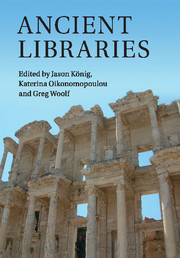23 results
Chapter 7 - Plutarch at the Symposium
-
-
- Book:
- The Cambridge Companion to Plutarch
- Published online:
- 29 June 2023
- Print publication:
- 13 July 2023, pp 138-156
-
- Chapter
- Export citation
M. MEEUSEN and L. VAN DER STOCKT (eds) Natural Spectaculars: Aspects of Plutarch’s Philosophy of Nature. Leuven: Leuven University Press, 2015. Pp. 253. €52. 9789462700437.
-
- Journal:
- The Journal of Hellenic Studies / Volume 140 / November 2020
- Published online by Cambridge University Press:
- 21 December 2020, pp. 283-284
- Print publication:
- November 2020
-
- Article
- Export citation
BRENK'S WORK ON PLUTARCH - (L.) Roig Lanzillotta (ed.) Frederick E. Brenk on Plutarch, Religious Thinker and Biographer. “The Religious Spirit of Plutarch of Chaironeia” and “The Life of Mark Antony”. With the collaboration of Luisa Lesage. (Brill's Plutarch Studies 1.) Pp. viii + 344. Leiden and Boston: Brill, 2017. Cased, €149, US$172. ISBN: 978-90-04-34876-9.
-
- Journal:
- The Classical Review / Volume 70 / Issue 2 / October 2020
- Published online by Cambridge University Press:
- 04 May 2020, pp. 354-355
- Print publication:
- October 2020
-
- Article
- Export citation
Contributors
-
-
- Book:
- Encyclopaedism from Antiquity to the Renaissance
- Published online:
- 05 October 2013
- Print publication:
- 17 October 2013, pp x-xiv
-
- Chapter
- Export citation
6 - Plutarch'scorpus ofquaestionesin the tradition of imperial Greek encyclopaedism
- from Part I - Classical encyclopaedism
-
-
- Book:
- Encyclopaedism from Antiquity to the Renaissance
- Published online:
- 05 October 2013
- Print publication:
- 17 October 2013, pp 129-153
-
- Chapter
- Export citation
Acknowledgments
-
- Book:
- Ancient Libraries
- Published online:
- 05 May 2013
- Print publication:
- 25 April 2013, pp xviii-xviii
-
- Chapter
- Export citation
Part III - Libraries of the Roman Empire
-
- Book:
- Ancient Libraries
- Published online:
- 05 May 2013
- Print publication:
- 25 April 2013, pp 235-417
-
- Chapter
- Export citation
List of abbreviations
-
- Book:
- Ancient Libraries
- Published online:
- 05 May 2013
- Print publication:
- 25 April 2013, pp xix-xx
-
- Chapter
- Export citation
Index locorum
-
- Book:
- Ancient Libraries
- Published online:
- 05 May 2013
- Print publication:
- 25 April 2013, pp 474-479
-
- Chapter
- Export citation
General index
-
- Book:
- Ancient Libraries
- Published online:
- 05 May 2013
- Print publication:
- 25 April 2013, pp 463-473
-
- Chapter
- Export citation
Bibliography
-
- Book:
- Ancient Libraries
- Published online:
- 05 May 2013
- Print publication:
- 25 April 2013, pp 418-462
-
- Chapter
- Export citation
Part I - Contexts
-
- Book:
- Ancient Libraries
- Published online:
- 05 May 2013
- Print publication:
- 25 April 2013, pp 21-82
-
- Chapter
- Export citation

Ancient Libraries
-
- Published online:
- 05 May 2013
- Print publication:
- 25 April 2013
Contents
-
- Book:
- Ancient Libraries
- Published online:
- 05 May 2013
- Print publication:
- 25 April 2013, pp v-vii
-
- Chapter
- Export citation
Part II - Hellenistic and Roman Republican libraries
-
- Book:
- Ancient Libraries
- Published online:
- 05 May 2013
- Print publication:
- 25 April 2013, pp 83-234
-
- Chapter
- Export citation
List of figures
-
- Book:
- Ancient Libraries
- Published online:
- 05 May 2013
- Print publication:
- 25 April 2013, pp viii-x
-
- Chapter
- Export citation
Ancient Libraries - Half title page
-
- Book:
- Ancient Libraries
- Published online:
- 05 May 2013
- Print publication:
- 25 April 2013, pp i-ii
-
- Chapter
- Export citation
Ancient Libraries - Title page
-
-
- Book:
- Ancient Libraries
- Published online:
- 05 May 2013
- Print publication:
- 25 April 2013, pp iii-iii
-
- Chapter
- Export citation
Notes on contributors
-
-
- Book:
- Ancient Libraries
- Published online:
- 05 May 2013
- Print publication:
- 25 April 2013, pp xi-xvii
-
- Chapter
- Export citation
Copyright page
-
- Book:
- Ancient Libraries
- Published online:
- 05 May 2013
- Print publication:
- 25 April 2013, pp iv-iv
-
- Chapter
- Export citation



